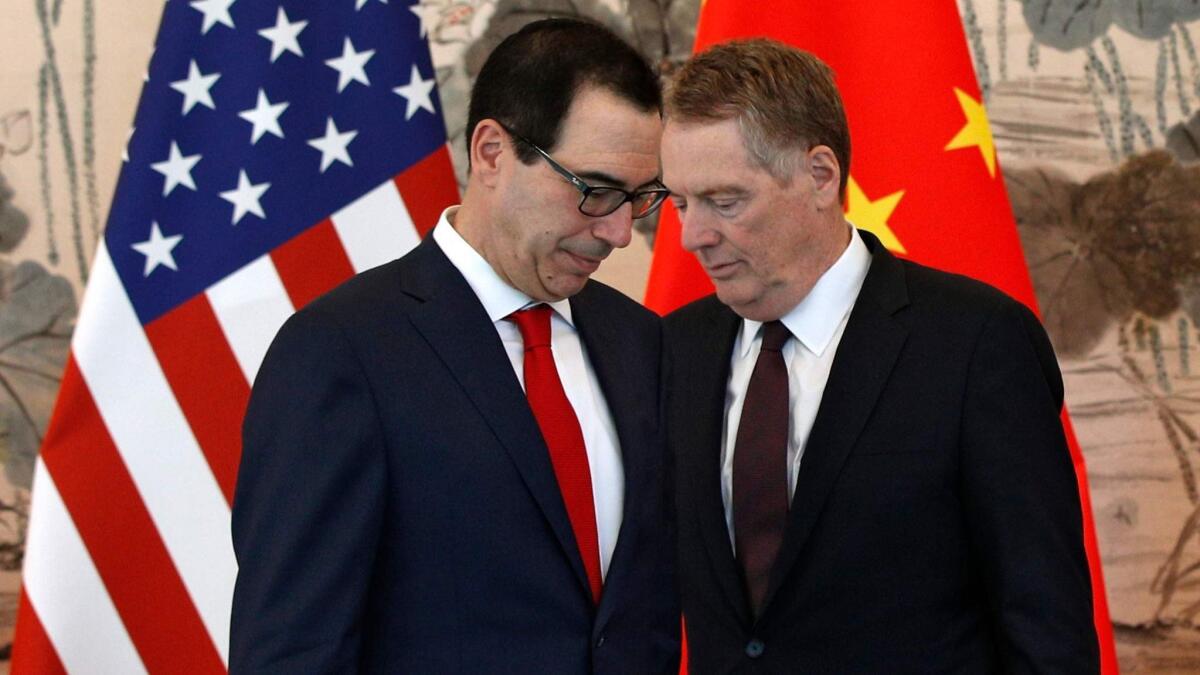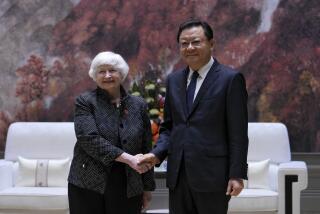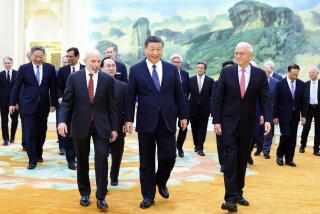U.S. says it will raise tariffs, accusing China of reneging on promises

Senior Trump administration officials on Monday accused China of reneging on commitments made during trade negotiations, warning that the United States would follow through on President Trump’s weekend threat to ratchet up tariffs on Chinese goods this Friday.
The accusations marked a setback after several rounds of positive trade talks between the world’s two largest economies. The two sides had made substantial progress, and there were expectations that a deal could be announced as early as Friday after a visit this week by a large Chinese delegation.
U.S. Trade Representative Robert Lighthizer said Monday that the Chinese delegation was still planning to arrive in Washington for talks Thursday and Friday. If a deal is reached, it’s possible that China could avert an increase in tariffs on $200 billion of its exports, to 25% from the current 10%.
Trump already has imposed 25% tariffs on $50 billion worth of Chinese goods, and increasing that amount fivefold would be a dramatic escalation of a yearlong trade conflict that had eased in recent months.
As recently as last week Trump had indicated that the talks were progressing well, but Sunday he complained that a deal was moving “too slowly” and that the Chinese were attempting to “renegotiate.”
Besides raising levies to 25% on $200 billion of Chinese goods, Trump tweeted that he would “shortly” impose 25% duties on an additional $325 billion of Chinese imports. That would constitute virtually all Chinese goods entering the United States.
Trump had previously threatened to escalate tariffs but twice backed off, raising the possibility that he could suspend the deadline again.
Financial markets last year wobbled amid an exchange of tariffs and signs of an all-out trade war. But in December, Trump and Xi agreed to a cease-fire while the two sides talked, quieting investors’ fears.
On Monday, U.S. stocks initially tumbled but recovered to close with modest losses, suggesting that many investors are still hopeful of a near-term resolution.
Trump did not elaborate on why he suddenly revived the threat to raise tariffs, fueling speculation that the president was posturing or employing last-minute pressure tactics to close a deal.
But Lighthizer and Treasury Secretary Steven T. Mnuchin, who were in Beijing last week, said at the briefing Monday in Washington that China was backpedaling on language in the text, with the potential of significantly altering the deal, according to Bloomberg News.
Analysts familiar with the development said that one key element of the U.S. complaint centered on China’s resistance to codifying in Chinese law an agreement that dealt with strengthening intellectual property protections.
Derek Scissors, a China expert at the American Enterprise Institute, said he regarded this matter as more to do with form than substance. At the crux of it, he said, the Chinese did not want to include in the deal anything that would be taken as a repudiation of Chinese President Xi Jinping’s leadership.
“If we put the tariffs on Friday, that changes the trade dynamics,” he said, adding it would significantly raise the stakes.
Mnuchin, who has sought a softer line in confronting China, said he remained hopeful that a deal could be reached. Lighthizer, the leader of the U.S. talks, and others in the White House have pushed for tough measures to force China to make structural changes in its economic policies, including opening up markets and halting requirements that essentially force foreign firms to hand over technologies to do business in China.
In Beijing, Chinese officials appeared to be taken aback by Trump’s tweet but were careful not to overreact.
Geng Shuang, a Foreign Ministry spokesman, said China was still preparing to send a delegation to Washington for the trade talks, although he wouldn’t say when and whether Chinese Vice Premier Liu He, Xi’s right-hand man on economic policy, would lead the delegation.
“There have been many times that the U.S. side has threatened to increase tariffs,” Geng said in responding to Trump’s tweets.
Liu has been burned twice in the past with U.S. visits that turned out to yield little progress. Analysts said that if he didn’t make the trip, it was highly unlikely that the two sides could wrap up a deal this week.
“A chance of no deal this week is quite high and a chance of no deal in the coming months is rising,” said Nicholas Lardy, a China economy expert at the Peterson Institute for International Economics.







